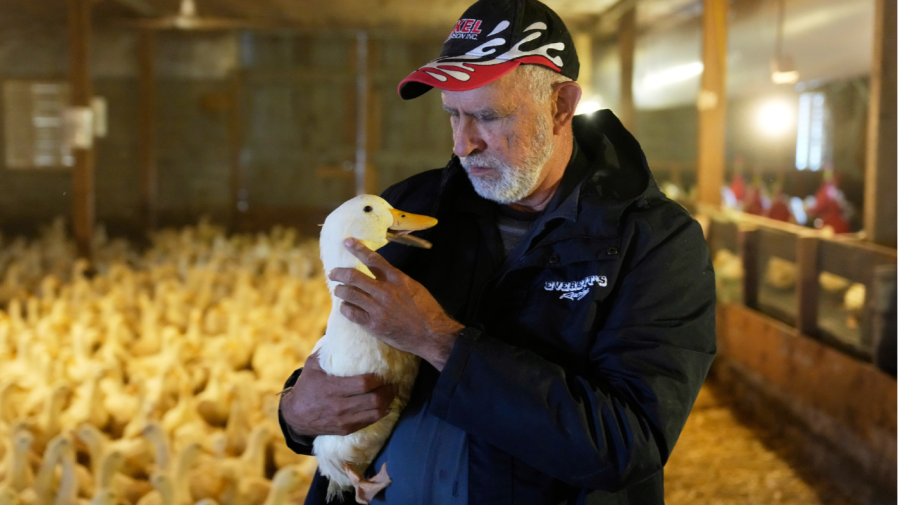
The May Consumer Price Index reflected another drop in egg prices — something President Trump and other officials from the administration have misleadingly touted as a sign that their moves to reduce the cost of groceries are working.
While the price decrease — albeit slight — provides welcome relief on grocery bills as children start to raid the fridge during summer break, egg prices are still 41 percent higher than they were a year ago.
And the truth is, under the policies followed by both the Biden and Trump administrations, those prices will likely go back up.
The main cause of the spike in egg prices has been the three-year bird flu outbreak. The U.S., under both Biden and Trump, has failed to drive an effective response to this pandemic. While Trump promised a change in direction, the USDA’s new response to bird flu can be summed up with one contrast: more money for big corporations, less money for scientists.
We were highly critical of the Biden administration’s weak and insufficient response to bird flu, arguing that it was too slow and too deferential to industry concerns.
When Trump’s Agriculture secretary, Brooke Rollins, announced she would break with their approach and commit $1 billion to the crisis — including $100 million to develop vaccines for poultry — it seemed like a potential turning point.
Less than two weeks later, Rollins flipped. After “speaking with industry leaders,” she announced vaccines were off the table. Instead, she would focus on “repopulation” — a term the industry invented to allow the government to bail it out not once, but twice.
Meanwhile, USDA staff who were actually monitoring the outbreak are reportedly among those being laid off by Trump’s DOGE team. The meat industry’s iron grip on agricultural policy has clearly survived into the second Trump administration.
The stubborn, ongoing spread of bird flu has driven up egg prices and the chances of a deadly human pandemic. The USDA’s policy on containing it has been dictated by what’s best for the profits of big chicken and egg companies and has entirely ignored the agency’s other responsibility: to protect the public health and economy. It is not working.
Under Biden, the USDA’s strategy was based on the hope that the outbreak could be contained to a few locations and that the industry, as a whole, did not need to make any changes.
The USDA asked meat and egg companies to report any infections and then kill the entire flock in order to “stamp out” the virus before it could spread. To encourage compliance, the USDA paid these companies “indemnity” payments — essentially bailouts that covered both the cost of the lost birds and the killing operations.
This plan has been an expensive and spectacular failure.
Despite $1.25 billion in bailout payments to egg and poultry producers, the virus is spreading faster than ever. Three years into this most recent outbreak, almost 40 percent of the infections in egg-laying hens have happened in just the last few months, according to the bailout data, including the emergence of a new bird flu strain, D1.1.
This is not surprising. These taxpayer bailouts have removed any market incentive for these companies to behave responsibly. Bird flu continues to spread quickly through the U.S. farm system because that system is inherently a viral playground.
Birds are kept in disgusting, crowded conditions that encourage viral spread. The USDA has refused to mandate any changes to these conditions, nor has it forced companies to take any meaningful preventive measures.
As a result, the largest egg and meat companies, like Jennie-O, Herbuck’s and Cal-Maine Foods, have received huge payments. Jennie-O has received the most bailout money, roughly $120 million, since the beginning of the outbreak. The brand is a division of Hormel Foods, which made $1.1 billion in profit in 2024.
In fact, our investigation revealed that the government has paid out at least $365 million to repeat offenders. As of December, USDA data shows that 67 farms had H5N1 outbreaks twice or more, with 19 reporting three or more separate occurrences of reinfection.
Supposedly, the USDA has coupled these bailouts with new requirements for companies to implement “biosecurity measures,” such as employees showering before and after work. But there is zero practical enforcement.
The USDA’s Animal and Plant Health Inspection Service recently admitted that its “audit” process was worthless — it, thus far, involved no visual inspection and allowed companies to certify their own compliance by filling out a paper-based audit form. Unsurprisingly, no company has ever failed this so-called audit despite the rapid spread of disease.
A new rule was released in December that was meant to increase the rigor of inspections, but the rule still allows for exceptions and “virtual” inspections, with the company controlling what inspectors see.
In fact, the majority of farms don’t face any safety requirements at all.
Under a loophole, industrial-scale farms are deceptively classified as “small” producers and are exempt from implementing any biosecurity plans whatsoever before getting bailout money. But the exception applies to any farm with fewer than 75,000 laying hens, which is well over 99 percent of egg farms, housing about 77 million hens.
The Trump administration came into power as sharp critics of the Biden bird flu strategy. But Rollins is now saying that the Trump administration will not only continue indemnities for the mass culling approach, but they will double down on this policy.
She announced $400 million for continued indemnities plus new payments to producers for “repopulation,” meaning buying new birds, even though companies were already paid once for the value of the destroyed birds.
Recent reporting indicates these payouts will come at the expense of money for local food banks and schools that would have supported smaller, healthier farms.
Rollins is now also following industry talking points on opposing vaccines for our poultry supply. Mass vaccination has been successful at limiting the spread in other countries, such as France, and the United Nations has encouraged vaccinations in its recent call for governments to step up their response.
But the industry has fought hard against it here, because vaccinated birds often cannot be exported to other countries, and the industry’s profits are dependent on the export market.
The Trump administration’s rapid capitulation to industry pressure proves what critics like us have long argued: Our food safety system is fundamentally broken. No administration, Republican or Democratic, has shown the political will to challenge the meat industry’s destructive practices.
Real leadership requires fundamentally reforming the industrial animal agriculture system that makes pandemics inevitable and is making all of us less healthy and less safe.
Andrew deCoriolis is the executive director of Farm Forward. Gail Hansen is a public health veterinary expert, an independent consultant and former state epidemiologist and state public health veterinarian for the Kansas Department of Health and Environment.


